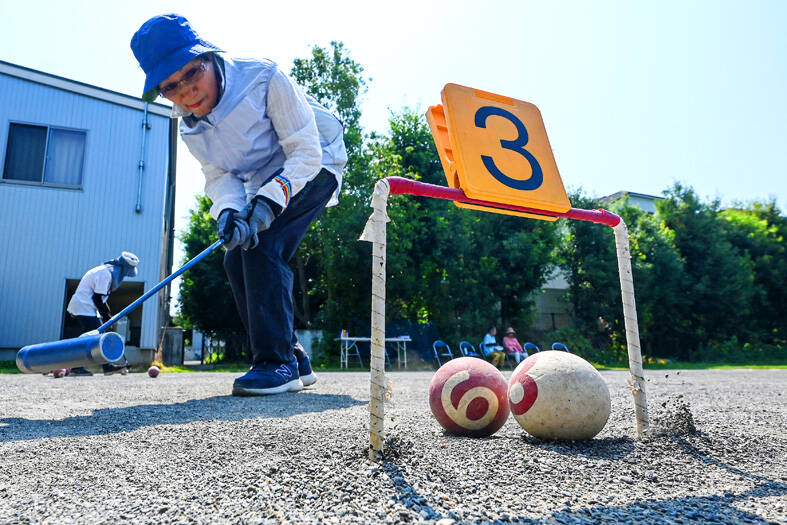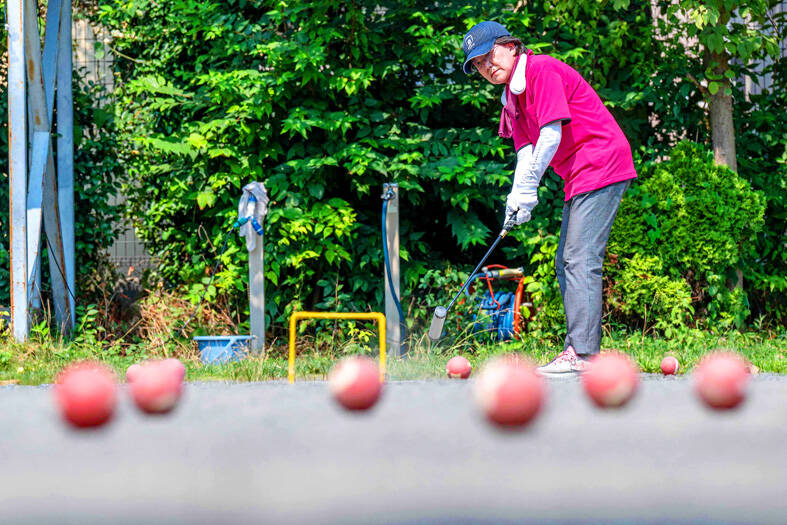Under a scorching sun in Tokyo, octogenarian Katsuko Morita swings her mallet and whacks a ball through a small gate.
The diehard gateballer plays almost every day, even when the mercury soars.
“Some of my friends in my generation tell me I must be crazy to go out playing gateball in this heat,” Morita, 81, told reporters at a practice session of the croquet-inspired game.

Photo: AFP
“When I’m playing the game, the heat doesn’t bother me,” she said, her face shaded by a wide-brimmed hat.
Near-record temperatures across Japan this summer have sparked frequent heatstroke alerts and warnings for people, particularly the elderly, to use air-conditioners and stay cool.
Japan has the second-oldest population in the world after the tiny state of Monaco, and official data show the elderly made up more than 80 percent of heatstroke deaths in the past five years.

Photo: AFP
While gateball requires little physical exertion, players have to spend time in the punishing sun as two opposing teams carefully hit balls through gates.
Morita and her fellow gateballers take precautions, such as standing in the shade when they can, wearing protective clothing, staying hydrated and using ice packs to cool their bodies.
This year, training was moved to the mornings to avoid the afternoon temperatures. Play is stopped if the mercury reaches 35°C.
Gateball gained traction in Japan after World War II. It was seen as a cheap pastime for children when most families were struggling to find food and other necessities.
It remains hugely popular, particularly among elderly people. About 90 percent of gateballers in Tokyo are 70 or older, said Toshiaki Koizumi of the Tokyo Gateball Union.
Several times a week, Morita and other players meet at an outdoor gateball court in Tokyo’s Suginami District to train for official tournaments. It is a chance to socialize, but they take the training seriously, as no one likes to lose.
Wearing hats and long sleeves to avoid sunburn, the players walk around the gravel court with surprising energy in the sizzling heat, taking turns hitting the ball through gates.
Occasionally, someone even shouts “hit stronger,” or “think harder” when a player botches a shot.
Some players put ice packs under their hats or around their necks, while at least one had invested in a vest with two fans sewn into the sides.
“The heat this year is insane. I’ve never experienced anything like this,” said Makoto Kabe, 78.
Kabe said he used to deride gateball as an old people’s game, but admitted he was now “hooked” on the strategic play.
“If I just kept myself to an air-conditioned room watching TV all day, I would go senile,” Kabe said, laughing. “The game helps keep your brain active.”
After training, the players cool down by eating ice pops in the shade of nearby trees, the intensity of their rivalry melting away as they chat and laugh.
“I’m coming here to expose myself to the outside world. This is also the place where I get to see many of my friends,” said Michiko Aoki, who prides herself on looking younger than her 81 years.
“When I lose in a game, I sometimes can’t even sleep,” she added. “Eating, sleeping and gateball are the three biggest parts of my life now.”

Manchester City have reached do-or-die territory in the UEFA Champions League earlier than expected ahead of what Pep Guardiola has described as a “final” against Club Brugge today. City have disproved the suggestion a new format to Europe’s top club competition would remove any jeopardy for the top clubs as Guardiola stares down the barrel of failing to make the Champions League knockout stages for the first time in his career. The English champions have endured a torrid season both in their English Premier League title defense and on the continent. A run of one win in 13 games, which included Champions League

Oklahoma City star Shai Gilgeous-Alexander on Sunday poured in 35 points as the Thunder grabbed a bounce-back 118-108 victory in Portland to push their NBA-best record to 37-8. The Thunder, surprised by the short-handed Dallas Mavericks on Thursday, fended off a late surge from the Trail Blazers to snap their four-game winning streak. Jalen Williams scored 24 points and Isaiah Joe added 16 off the bench. Center Isaiah Hartenstein, back after a five-game absence with a calf injury, added 14 points, 11 rebounds, six assists and a big block. The Western Conference leaders were under pressure late as Portland, trailing by 15 heading

The Golden State Warriors on Wednesday withstood Oklahoma City star Shai Gilgeous-Alexander’s 52-point outburst to beat the Western Conference leading Thunder 116-109. Andrew Wiggins scored 27 points and Warriors superstar Stephen Curry scored 17 of his 21 points in the second half as Golden State erased a double-digit deficit and pulled away late for the victory. “We just stayed solid,” said Curry, who entered the contest mired in a shooting slump and had just four points on one basket in the first half. “Just all-around effort.” The Thunder, fueled by 31 first-half points from Gilgeous-Alexander, led by as many as 14 in the

Ousmane Dembele on Wednesday scored a hat-trick as Paris Saint-Germain romped to a 4-1 win at VfB Stuttgart and qualified for the UEFA Champions League knockout stages. PSG were at risk of elimination after a disappointing league stage, with three losses and a draw, but were utterly dominant against an outclassed Stuttgart side as they confirmed their place in the playoffs. With six minutes gone, Bradley Barcola headed PSG in front after Desire Doue stood a cross up at the back post following a corner. Stuttgart probed for an equalizer, but PSG hit on the counterattack, Dembele tapping a Barcola pass into an